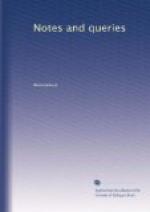“These are the pretty responsories, these are the dear antiphonies that so bewitched of late our prelates and their chaplains with the godly echo they made and besotted, as to the gay imitation of a lordly imprimatur, one from Lambeth House, another from the west end of Paul’s; so apishly romanising, that the word of command still was set down in Latin, as if the learned grammatical pen that wrote it would cast no ink without Latin; or, perhaps, as they thought, because no vulgar tongue was worthy to express the pure conceit of an imprimatur; but rather, as I hope, for that our English, the language of men ever famous and foremost in the achievements of liberty, will not easily find servile letters enow to spell such a dictatory presumption englished.”
On the 28th September, 1647, the Lords and Commons passed a still more severe ordinance, which imposed pains and penalties on all persons printing, publishing, selling, or uttering any book, pamphlet, treatise, ballad, libel, or sheet of news, without the licence of both, or either House of Parliament, or such persons as should be thereunto authorised by one or both Houses. Offending hawkers, pedlars, and ballad-chappers were to be whipped as common rogues. (Parliamentary History, xvi. 309.) We get some insight into the probable cause of this ordinance from a letter of Sir Thomas Fairfax to the Earl of Manchester, dated “Putney, 20th Sept., 1647.” He complains of some printed pamphlets, very scandalous and abusive, to the army in particular, and the whole kingdom in general; and expresses his desire that these, and all of the like nature, might be suppressed for the future. In order, however, to satisfy the kingdom’s expectation for intelligence, he advises that, till a firm peace be settled, two or three sheets might be permitted to come out weekly, which might be licensed; and as Mr. Mabbott had approved himself faithful in that service




